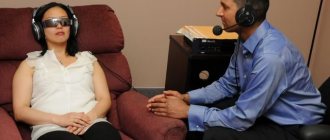Socio-psychological adaptation as a psychological category
There are biophysiological and socio-psychological adaptation.
Definition 2
Socio-psychological adaptation is the process of a person mastering certain socio-psychological roles, acquiring a certain socio-psychological status, the desire to optimize and harmonize relationships with the socio-natural surrounding reality.
Finished works on a similar topic
- Coursework Types of adaptation 440 rub.
- Abstract Types of adaptation 270 rub.
- Test work Types of adaptation 230 rub.
Receive completed work or specialist advice on your educational project Find out the cost
Types of adaptation
Depending on the success/failure of adaptation processes, the following types of personality adaptability arise:
- internal, which finds its representation in the form of restructuring of functional structures, personal systems during certain transformations of the external environment in which the life of the individual takes place. In such a situation, the external forms of behavior of the individual are in full compliance with the requirements and expectations of the environment, and generalized personal adaptation occurs. Full adaptation makes it possible to achieve the adequacy of a person’s mental activity to the given conditions;
- external, adaptive, behavioral adaptation is carried out when the personality does not internally change, does not restructure, preserving its selfhood;
- mixed, during the implementation of which the personality partially changes, adapts internally to the conditions, norms and values of the surrounding socio-natural environment, while at the same time maintaining one’s self, partially adapting externally and behaviorally.
Too lazy to read?
Ask a question to the experts and get an answer within 15 minutes!
Ask a Question
In addition, the following types of adaptation are distinguished:
- progressive, the implementation of which achieves unity of goals, interests of the individual and the social community;
- regressive, formal, which does not lead to the formation of unity of goals and interests of the individual and the social community, does not meet the interests of the development of the individual and society.
Adaptation disorders: causes, signs, overcoming
Adaptation disorder, also called a disorder of adaptive reactions, is an anomaly manifested by psychotic symptoms, vegetative signs, and behavioral reactions. Adaptation disorder can occur for a variety of reasons due to exposure to intense or long-term stress factors. The dominant initiator of violations of adaptive reactions are significant changes in the subject’s usual way of life, caused by the extreme situation that has taken place. At its core, adaptation disorder is a long-term reaction to the influence of stress factors, which is distinguished by the particular intensity and depth of a person’s negative experiences. Problems with adaptation that arise in a person significantly worsen his social interaction, interfere with the performance of professional activities, and make full contacts with the opposite sex impossible. Violations of adaptive reactions are not pronounced and occur in a milder form of psychogenic depression or anxiety-phobic disorders. Based on the dominant symptoms, certain types of adaptation disorders are distinguished, in which the following symptoms predominate in patients:
- sad mood;
- obsessive anxiety;
- a combination of irrational fear and depressive triad.
- change or deterioration in social status;
- changes in a person’s financial situation;
- exclusion of a person from membership in any social or political group;
- loss of housing;
- dismissal from a position.
- problems in personal relationships;
- frequent conflicts in the family;
- lack of understanding between spouses;
- poor relationships in the work or educational community;
- regular financial difficulties;
- inability to satisfy your basic needs;
- difficulties of a sexual nature.
- eliminate the symptoms of the disorder, thereby saving the patient from suffering;
- help a person find a normal emotional state;
- to facilitate his rapid return to society as a full member;
- lay the groundwork for the subsequent absence of pathological reactions when exposed to stressors;
- prevent the development of severe psychosis.
Adaptation disorder: causes
Adaptation disorder is the result of a pathological reaction to the action of stress factors, varying in intensity and duration of influence. Violation of adaptive reactions occurs if the emergency situation was followed by significant changes in a person’s life. The most common cause of adaptation disorders is a pathological, complicated grief reaction associated with loss. Moreover, the definition of “loss” implies not only the death of a loved one or close relative. A significant loss for an individual is divorce from a spouse or termination of a relationship with a partner. A global loss for an individual is the collapse of his life ideals and the collapse of habitual moral values. An equally significant loss, which over time can give rise to an adaptation disorder, is physical injury received as a result of an accident, amputation of a part of the body due to a serious illness, dysfunction of an organ due to a progressive somatic disease. The causes of adaptation disorders are also:
Violations of adaptive reactions are likely consequences of prolonged exposure to chronic stress factors caused by the following circumstances:
In some situations, adaptation disorders arise when a person lives in unsafe places or in disadvantaged areas. According to the assumption, women are at higher risk of developing disorders of adaptive reactions compared to men. People who experience poor medical care are more likely to have adjustment problems. Also, certain facts from a person’s childhood can lead to the development of adaptation disorders, such as: growing up in a family that is too poor or too rich, or living with parents who drink. A person’s exposure to extreme conditions can lay the groundwork for pathological reactions to stressful events. You should know that in most cases, adaptation disorders do not arise directly from a traumatic situation. After an extreme event, a certain time interval passes, after which disturbances in adaptive reactions become noticeable. During this period, unexpressed depressive symptoms are observed, for example: low mood, apathy, fatigue. People often interpret such manifestations as signs of ordinary illness. Adaptation disorders: symptoms
Manifestations of adaptation disorders are diverse and unique for each person.
However, there are also common symptoms that affect most people. First of all, the portrait of a person who suffers from adaptation disorder changes. Outwardly, such a person looks much older than his biological age. Deep wrinkles become noticeable. Hair turns gray abundantly and rapidly. Dark circles appear under the eyes of the affected person. The person's look is tired and indifferent to what is happening. With adaptation disorder, the conditions of social interaction are also violated. The affected person avoids contact with others or reduces it to a minimum, preferring to spend time alone. When communication is necessary, the person speaks in a quiet voice. The pace of a person's speech is slow. He answers questions addressed to him monosyllabically and concisely. At the same time, he himself does not ask his interlocutor clarifying questions. It becomes noticeable to others that it is very difficult for a sick person to gather his thoughts and concentrate on the action being performed. To begin performing a task, he needs to make a significant volitional effort. The person becomes uninitiated and mechanically performs his professional duties. The person also finds it difficult to make decisions and doubts the correctness of the choice made. With adaptation disorder, the quality of work performed significantly deteriorates, and the volume of tasks completed per working day decreases. At the same time, the injured person understands his inadequacy, but tries with all his might to disguise this fact from others. The psychological status of the patient also undergoes enormous changes. The person is depressed and feels sad. He loses the ability to enjoy previously enjoyable activities. His circle of interests is narrowing. Very often, depressive symptoms are accompanied by an illogical, obsessive feeling of fear. The patient experiences insurmountable anxiety and anticipates the onset of some kind of catastrophe. Adjustment disorder “rewards” a person with the feeling that it is impossible to cope with difficulties and overcome the problem. A person feels incompetent and reproaches himself for not being able to work at full capacity. Often the injured subject develops ideas of his own guilt and worthlessness. The affected person underestimates his abilities and is confident that positive changes cannot occur in him in the future. With adaptation disorder, severe sleep problems are determined. In the evening, a person cannot fall asleep for a long time. Plunged into sleep, he sleeps in an uneasy fitful sleep with frequent nightmares. He wakes up in the pre-dawn hours and does not feel fresh and energetic. Another symptom of adaptation disorder is a person’s excessive impressionability and vulnerability. The sick person is very sensitive to comments and criticism from others. At the slightest provocation she is ready to cry. The affected person becomes easily suggestible, he quickly agrees with the opinion of the interlocutor and succumbs to the influence of others. In some cases, progressive social isolation is observed, when a person completely breaks off any contact with others. In parallel with this, a feeling of hostility and hatred towards certain representatives of society may arise. Some affected people develop paranoid ideas over time. Of the autonomic symptoms of adaptation disorders, the dominant position is occupied by a persistent increase in blood pressure. A person often suffers from headaches and feels dizzy. Somatic signs of pathology from the digestive tract also appear. Some people's appetite worsens or disappears altogether, and they voluntarily fast. Other individuals, on the contrary, have an insatiable feeling of hunger, and they absorb large amounts of food. Some patients suffering from adjustment disorder begin to take drugs and abuse alcohol. There are also those victims whose violation of adaptive reactions leads them to the ranks of gamblers who spend all their capital in casinos or on slot machines. Some people become religious fanatics or join some sects. A characteristic feature of many patients with adaptation disorder is neglect or denial of the moral norms and rules of behavior existing in society. A person’s criticism of his behavior decreases, while he considers many unseemly and illegal acts to be normal and acceptable phenomena. Treatment of adaptation disorder
Medical assistance for violation of adaptive reactions has several goals:
To eliminate the demonstrated symptoms of adaptation disorder, drug treatment is carried out using antidepressants and tranquilizers of the benzodiazepine class. After relief of the acute condition, they move on to the main component of treatment - psychotherapeutic work. The psychotherapist explains to the patient the features of his condition and informs him about the mechanisms of development of adaptation disorder. Thanks to psychotherapy, it is possible to establish the trigger of pathology - the initial element that launched the cascade of pathological reactions. The subsequent implementation of measures for a different interpretation of the traumatic situation makes it possible to break the once formed vicious circle. During psychotherapeutic sessions, the client receives knowledge of how to competently and painlessly counteract stress factors. The patient will learn what methods exist to relieve psycho-emotional stress. In difficult situations, treatment with hypnosis may be required, since very often the negative life program is hidden from a person’s conscious perception and is located at a different level of the psyche - the subconscious. To change a destructive life strategy, the patient is immersed in a state of hypnotic trance and suggestion is performed - a special verbal attitude that motivates the person to make a full recovery.









